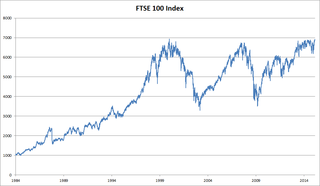British Steel may refer to :

British Steel was a major British steel producer. It originated from the nationalised British Steel Corporation (BSC), formed in 1967, which was privatised as a public limited company, British Steel plc, in 1988. It was once a constituent of the FTSE 100 Index. The company merged with Koninklijke Hoogovens to form Corus Group in 1999.
Vickers was a famous name in British engineering that existed through many companies from 1828 until 1999.
The General Electric Company, or GEC, was a major UK-based industrial conglomerate involved in consumer and defence electronics, communications, and engineering. The company was founded in 1886, was Britain's largest private employer with over 250,000 employees in the 1980s, and at its peak in the 1990s, made profits of over £1 billion a year.
British Motor Holdings Limited (BMH) was a British vehicle manufacturing company known until 14 December 1966 as British Motor Corporation Limited (BMC). BMH was created as a holding company following the BMC's takeover of both Jaguar Cars and the Pressed Steel Company in that year.
GKN Ltd is a British multinational automotive and aerospace components business headquartered in Redditch, Worcestershire. It is a long-running business known for many decades as Guest, Keen and Nettlefolds. It can trace its origins back to 1759 and the birth of the Industrial Revolution.

The Financial Times Stock Exchange 100 Index, also called the FTSE 100 Index, FTSE 100, FTSE, or, informally, the "Footsie", is a share index of the 100 companies listed on the London Stock Exchange with the highest market capitalisation. It is seen as a gauge of prosperity for businesses regulated by UK company law. The index is maintained by the FTSE Group, a subsidiary of the London Stock Exchange Group.

In a limited company, the liability of members or subscribers of the company is limited to what they have invested or guaranteed to the company. Limited companies may be limited by shares or by guarantee. The former may be further divided in public companies and private companies. Who may become a member of a private limited company is restricted by law and by the company's rules. In contrast, anyone may buy shares in a public limited company.
The Marconi Company was a British telecommunications and engineering company that did business under that name from 1963 to 1987. It was derived from earlier variations in the name and incorporation, spanning a period from its inception in 1897 until 2006, during which time it underwent numerous changes, mergers and acquisitions. The company was founded by the Italian inventor Guglielmo Marconi and began as the Wireless Telegraph & Signal Company. The company was a pioneer of wireless long distance communication and mass media broadcasting, eventually becoming one of the UK's most successful manufacturing companies. In 1999, its defence manufacturing division, Marconi Electronic Systems, merged with British Aerospace to form BAE Systems. In 2006, extreme financial difficulties led to the collapse of the remaining company, with the bulk of the business acquired by the Swedish telecommunications company, Ericsson.

The Thomson-Houston Electric Company was a manufacturing company which was one of the precursors of the General Electric company.
P&O may refer to:
The fathom is an English unit of measurement. Fathom may also refer to:
Dorman Long is an engineering consultancy and equipment manufacturer for the construction of long-span bridges, power stations, refineries, offshore structures, stadia and other large building structures. Originally based in Middlesbrough, North East England, the company was a major steel producer later diversifying into bridge building. Dorman Long was once listed on the London Stock Exchange.
Vickers plc was the remainder of Vickers-Armstrongs after the nationalisation of three of its four operating groups: aviation, shipbuilding and steel. It was purchased by Rolls-Royce plc in 1999, and the Vickers company name became defunct in 2004.
ITV or iTV may refer to:
The future is the time after the present.
Guglielmo Marconi (1874–1937) was an Italian radio pioneer.
George Cohen, Sons and Company was a scrap metal merchant with offices in Commercial Road, London. The company was founded by George Henry Cohen (d.1890) as Messrs. George Cohen & Co. in 1834 and changed its name to George Cohen, Sons and Co. in 1883 on the appointment of Michael Cohen, son of the founder. After the First World War the company won a number of large contracts to dispose of surplus munitions including "400,000 tons of high explosives and other shells". The company also engaged in demolition work, with projects including the towers of Crystal Palace, which had survived the great fire, the Dome of Discovery and Skylon at the Festival of Britain, and London's tram system. In 1940 the company moved its head offices to Hammersmith.
Skinningrove steelworks is a steel mill in Skinningrove, North Yorkshire, England. The business was formed in 1874 as the Loftus Iron Company, after a liquidation of the company reformed in 1880 as the Skinningrove Iron Company. The works expanded from producing only pig iron to include steel production in the early 20th century, with mills specialising in long products including railway rail. As part of the business the company constructed a jetty at Skinningrove, and owned an ironstone mine in Loftus.